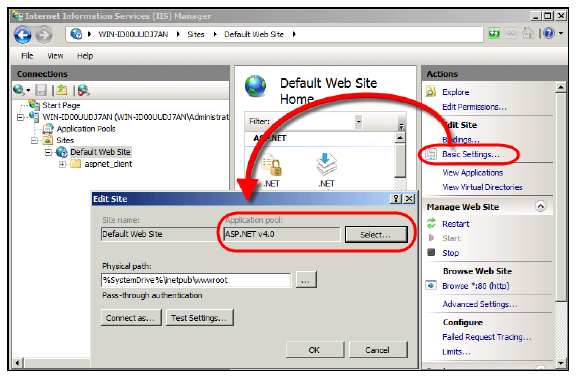Applying the Unified Search Page
Similar to the Personify Home Pages delivered with Personify
7.3.1, the Unified Search functionality was created as an ASPX page. To
install Unified Search and integrate it with your application, you need
to host the Unified Search ASPX page on your web server and apply
that ASPX page’s URL into your Application Parameters. The instructions
for doing so appear in this section.
To install and integrate Unified Search into Personify:
1. Using
IIS Manager, make sure your Application Pool is under the .Net 4.0 Framework
in Integrated Mode.
2. Navigate
to your release package and copy the UnifiedSearch folder to your
Web Server.
This folder contains a script that, when ran, creates a website named “PersonifyUnifiedSearch”
on your Web Server that hosts the Personify ASPX Home Pages.
· If
you want to modify this website and folder name, open Personify.UnifiedSearch.SetParameters.xml
in a text editor and modify the red text below in the code:
<setParameter
name="IIS Web Application Name" value="Default Web Site/PersonifyUnifiedSearch"
/>
· Save
and close the file.
 If
you decide to modify the website and folder name, make sure you do not
modify it to a name that already exists in your . . . /innetpub/wwwroot
folder.
If
you decide to modify the website and folder name, make sure you do not
modify it to a name that already exists in your . . . /innetpub/wwwroot
folder.
Also, if you have previously tried to apply the Personify Unified Search
and therefore already have a Personify Unified Search folder that exists
in your . . . /innetpub/wwwroot folder, make sure to delete this folder
before proceeding.
3. Using
MSDeploy, run the Personify.UnifiedSearch.deploy script.
If you do not have MSDeploy installed on your computer, please see the
following website for instructions on Web Deploy installation: http://go.microsoft.com/?linkid=9278654.
If you are unfamiliar with running command scripts with MSDeploy, please
see Running the Command Script section below.
4. When
complete, the script should have created the PersonifyHomePage folder.
Navigate to the following file path on your Web Server and verify the website
and folder creation:
.../innetpub/wwwroot/PersonifyUnifiedSearch
If you modified the website and folder name, it should appear with your
changes.
5. Make
sure your IIS User has FULL privileges to this folder.
6. Record
the URL for this newly created website.
For example, http://[your web server name]/PersonifyUnifiedSearch/
7. In
Personify, open the Application Parameters (APP008) screen.
8. Search
for the UNIFIED_SEARCH_URL parameter.
9. Enter
the recorded URL for where you hosted the ASPX files for step 6 in the
UNIFIED_SEARCH_URL parameter value.
You are now able to use the Unified Search functionality.
Running the Command Script
If you are unfamiliar with running command scripts with
MSDeploy, you can follow the instructions below.
To run the command script in MSDeploy:
1. Make sure you completed steps 1-3 of the previous
section.
2. Open
the Command Prompt with Administration privileges.
3. Access
the Package folder located on your server.
4. Type
the following command into the prompt and click Enter.
Personify.UnifiedSearch.deploy.cmd
/t
Doing so will simulate the installation, but not actually deploy it. If
your application pool is not currently configured for .Net 4.0, you will
receive the following error message:
Error: The application pool that you are trying to use has the ‘managedRuntimeVersion’
property set to ‘v2.0. This application requires ‘v4.0’.
Error count: 1.
5. If
you did not receive this error message, please proceed to step 6. If you
did receive the error message above, follow these steps to reconfigure
your application pool for .Net 4.0.
a. Open
the IIS Manager.
b. From
the IIS Manager, under Actions > Edit
Site, click Basic Settings.
The Edit Site screen displays.
c. Click
Select and select "ASP.NET
v4.0" from the list.

d. Click
OK to complete the configuration
change.
e. Back
in the Command Prompt, re-simulate the installation by typing the same
code in as in Step 4:
Personify.UnifiedSearch.deploy.cmd
/t
If no errors occur, you can proceed
to the next step.
If errors do occur, determine the error code and contact your Customer
Service Representative.
f. Open
the Command Prompt again and navigate back to the UnifiedSearch package
folder on your server.
g. Type
the following command into the prompt and click Enter.
This command performs the PersonifyUnifiedSearch installation.
Personify.UnifiedSearch.deploy.cmd
/y
h. Refresh
your IIS Websites list.
The PersonifyUnifiedSearch website, or whatever name you gave your website,
appears on the Websites list.
 If
you decide to modify the website and folder name, make sure you do not
modify it to a name that already exists in your . . . /innetpub/wwwroot
folder.
If
you decide to modify the website and folder name, make sure you do not
modify it to a name that already exists in your . . . /innetpub/wwwroot
folder.